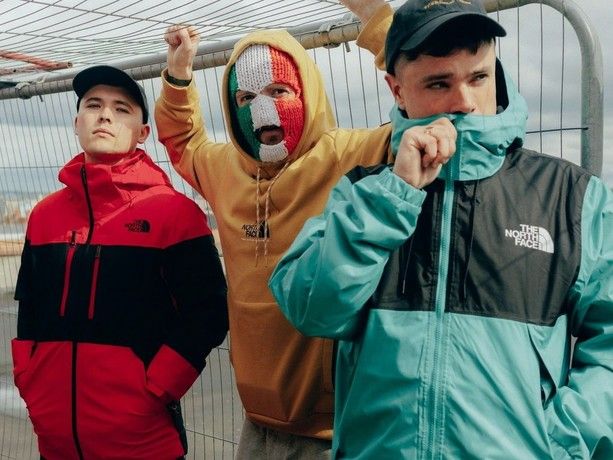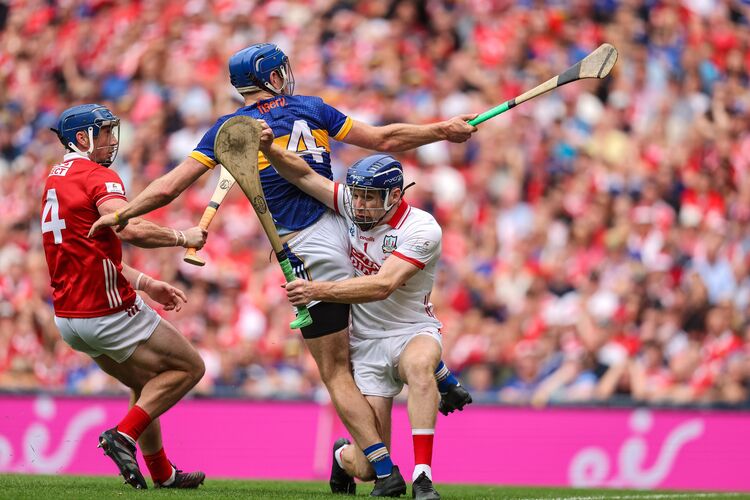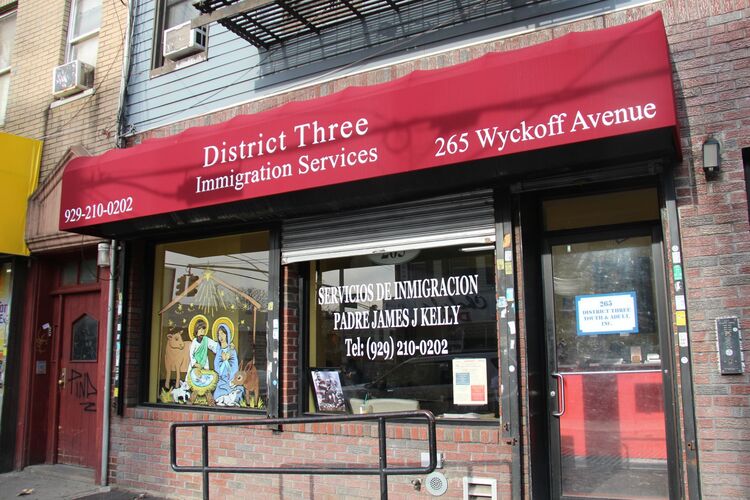Belfast rappers Kneecap established themselves as a riotous success in their native city and a rising force all over Ireland in the past three years, with a pounding mix of DJ beats and controversial but hilarious politically-charged lyrics, sung in the Irish language. This month, they take their sonic assault to US cinemas with the stateside launch of their self-titled biopic, directed by Rich Peppiatt, shot in Belfast, and starring the rappers, playing themselves, in their acting debut.
The rap trio - Naoise Ó Cairealláin, Liam Óg Ó hAnnaidh, and JJ Ó Dochartaigh (better known by their stage names, Móglaí Bap, Mo Chara, and DJ Próvai) - grabbed headlines in January of this year at their 2024 Sundance Festival screening, driving up to the cinema in a Police Service of Northern Ireland Land Rover, graffiti-sprayed with the band’s logo.
As an attention-grabber, it was second to none, even if local law enforcement was unsure what to make of the vehicle in question. The raucous response from festival-goers at the screenings resulted in the filmmakers strutting away with the NEXT Audience Award. This was soon followed by the selection of their film as Ireland’s entry in the upcoming 97thAcademy Awards, in the Best International Feature Film slot. If the Oscar nomination in that same category for “An Cailín Ciúin” last year gently pushed open the door for Irish-language films as awards contenders, the Kneecap movie kicks that door off its hinges.
The biopic tracks the origin of the group, from a drug-related altercation with that law that leaves Mo Chara locked up in a police cell, refusing to answer questions in English from the interrogating officers. A translator, a meek teacher (JJ Ó Dochartaigh), is brought into the cell to intercede, and is impressed with the rebellious teen’s notebook of jotted lyrics in Gaelic about his daily life in West Belfast. He offers to put music behind the lyrics of Mo Chara and his friend Móglaí Bap, and Kneecap is born.
The tweedy, bearded teacher rediscovers the inner raver of his youth, and enthusiastically embraces the decadent lifestyle of his younger bandmates. But, in the interests of plausible deniability, lest he jeopardize his day job, he performs under the stage name DJ Próvai, wearing the tricolour balaclava that is the group’s trademark.
The Kneecap rappers, self-styled “lowlife scum,” quickly make a name for themselves in Belfast as equal opportunity offenders - making enemies of the police, for their flagrant drug use, the Unionists for their anti-British lyrics, and, for good measure, dissident republicans, who are morally against their Class A substance distribution.
Este jueves 15 de agosto, #KNEECAP de Rich Peppiatt llegará a cines mexicanos gracias a @SonyPicturesMX
🎤 Protagonizada por el trío de hip-hop homónimo, la cinta representa a Irlanda para la categoría Mejor Película Internacional en los #Oscars 2025 🇮🇪 pic.twitter.com/jHXdymUVrR
— Cinema World (@cinemaworldmx) August 13, 2024
But are then for it, as long as they quit their offensive rapping and give the “dissies” a cut of their sales. All of this friction, danger, and burgeoning violence collides with a wave of rising enthusiasm from young fans of their music on both sides of the sectarian divide, that makes Kneecap too big to ignore, and too hot to stop.
Running parallel to this tale of hedonism and mayhem is a more serious strand to the Kneecap narrative - the campaign in Northern Ireland to have the Irish language officially recognized as having parity with English in the Six Counties, a status accorded previously in the Westminster Parliament to the Celtic languages of Scotland and Wales. Despite strong Unionist resistance in the Northern Ireland Assembly at Stormont, the Identity and Language (Northern Ireland) Act was finally signed into law in 2022.
New York City 🔥 pic.twitter.com/iwDJa3zYTY
— KNEECAP (@KNEECAPCEOL) July 31, 2024
The Kneecap bandmates give solid performances that belie their status as screen debutants. Real-life teacher JJ Ó Dochartaigh warrants special mention for his impressive range in the most complex role of the three. The passionate Irish-language advocate, frustrated by a dull Gaelic school curriculum that makes no connection with his pupils, is suddenly liberated by the incendiary Irish lyrics of his new bandmates - the strange-but-true duality of the mild-mannered schoolmaster by day, and bombastic beatmaster, in a tricolour tea-cosy, by night. For Hollywood star wattage, in a cast of otherwise unknowns, Michael Fassbender features in a small but powerful role as Móglaí Bap’s errant father - an IRA man on the run, and believed to be dead, who reappears to dispense some rough justice to wayward former comrades.
Kneecap’s music genre may be rap, but the film’s spirit is pure punk anarchy, from the city that gave us Stiff Little Fingers, Rudi, and The Outcasts a generation and a half ago. Questions present themselves as to how much of this film is true and how much of it fictionalized, but, like any band, the agit-prop pranksters of Kneecap are entitled to self-mythologize and in this biopic, the over-the-top legend of their genesis, they do it magnificently.
Kneecap is currently screening at Angelika, AMC Empire 25 Theater, and Alamo Drafthouse Cinema in Manhattan, and at BAM Rose Cinema in Brooklyn.







